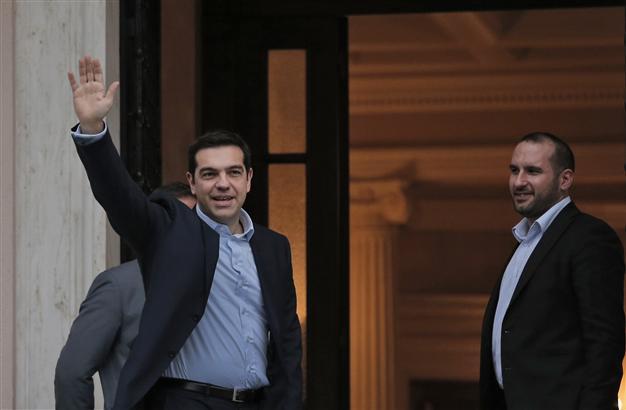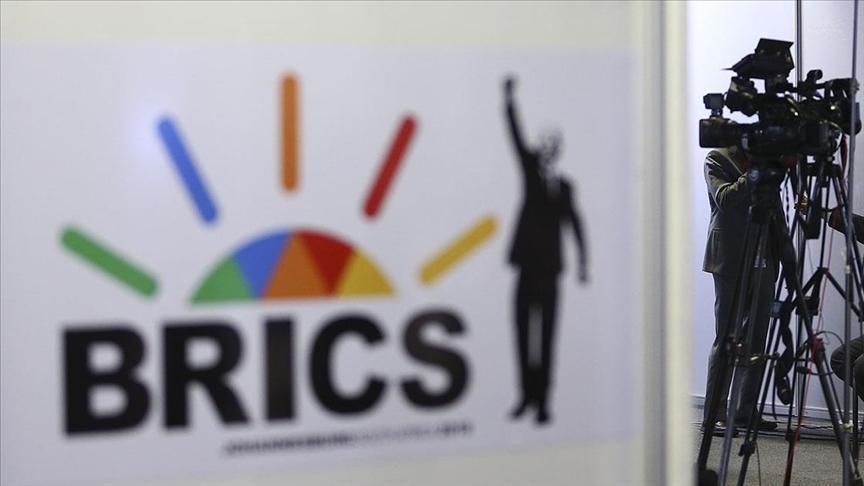New Greek leader set to unveil anti-austerity government
ATHENS - Agence France-Presse

Greece's Prime Minister Alexis Tsipras waves to the members of media as he arrives at Maximos Mansion, the Greek Prime Minister's official residence in Athens, Monday, Jan. 26. AP Photo
Greece's new Prime Minister Alexis Tsipras is set to unveil his anti-austerity coalition government Tuesday, bringing together his radical left-wing party with the nationalist right, after a stunning election win that sent shockwaves through Europe.With the new cabinet expected to be announced and sworn in on Jan. 27, the world will get a closer glimpse at Greece's Syriza-led administration, now on a collision course with international creditors over plans to renegotiate its massive bailout deal.
Syriza are the first anti-austerity party to govern in Europe, but they fell two seats short of a 151-seat majority in parliament and were thus forced to forge a coalition with the small right-wing Independent Greeks (ANEL) party.
Analysts have described the coalition as "unnatural" and potentially short-lived, saying that that ANEL -- best-known for vitriolic attacks on Germany -- are unpredictable, while the two parties differ starkly on immigration policy.
However, the two parties share a common opposition to the EU-IMF bailout, which forced sweeping spending cuts on Greeks and deepened a painful six-year recession.
Tsipras's first priority will be to deliver on his pledge to renegotiate the terms of the 240-billion-euro ($269 billion) bailout despite universal opposition from Greece's European allies.
Renewed fears that Greece could be forced out of the eurozone if it defaults on its debt repayments saw the euro hit an 11-year low against the dollar Monday, while Greek stocks closed down more than three percent.
The IMF extended an olive branch to the new Greek government, saying it was prepared to continue its financial support to the country.
"We stand ready to continue supporting Greece, and look forward to discussions with the new government," IMF Managing Director Christine Lagarde said in a statement.
However, EU Commission chief Jean-Claude Juncker warned that Greece cannot expect any reduction in its huge debt commitments.
"There is no urgent need for action" on Greece's debt, Juncker told German television station ARD, adding that a reduction "is not on the radar".
Many Greeks were optimistic that the fortunes of a country mired in deep recession were about to change for the better.
Nikos, a Syriza supporter in Athens, said: "Today is a very good day. I believe things will go well for our country."
But others were sceptical.
"There are many promises, but at the end there will be nothing. They only want power," said Athina Mantsinou as she walked through the capital's Syntagma Square -- scene of many demonstrations against austerity.
In a sign of the mammoth challenge ahead, the EU issued a stern statement that Greece will risk its place in the eurozone if it fails to meet its austerity and debt commitments.
From Brussels to Berlin, officials said they were open to talks with the new team in Athens, but many signalled its proposals were unrealistic.
In exchange for the bailout in 2010, Greece was forced to slash public-sector spending, cut wages and pensions and introduce a far-reaching programme of privatisation.
Syriza has pledged to reverse many of those measures.
But Chancellor Angela Merkel of European paymaster Germany made her views clear.
"In our view it is important for the new government to take action to foster Greece's continued economic recovery," her spokesman Steffen Seibert said. "That also means Greece sticking to its previous commitments."
Sunday's poll was Greece's fourth in five turbulent years, including back-to-back votes in 2012.
During that time the economy has shrunk by a quarter and unemployment has soared beyond 25 percent.
Syriza's victory could inspire other anti-austerity parties in Europe, including Spain's Podemos, which has topped several opinion polls and is aiming for an absolute majority in the Spanish election in November.
"Our victory is also a victory for all European peoples fighting against austerity that is destroying our common European future," Tsipras told supporters Sunday.
British finance minister George Osborne -- whose country does not use the euro -- said what Syriza was proposing was "incompatible with what the eurozone currently demands of its members".
However, British Prime Minister David Cameron issued a warmer statement late Monday, congratulating Tsipras and welcoming his "intention to tackle corruption and increase tax transparency across Greece".
Other European countries also said they were prepared to work with the new Greek government.
French President Francois Hollande invited Tsipras to Paris and Spain's conservative Prime Minister Mariano Rajoy said he hoped the victory would lead to a "stable government".
Italy saw the Greek result as possibly helping its push for greater flexibility in the EU's approach to budgets and broader economic issues, Foreign Minister Paolo Gentiloni said.
Martin Schulz, the president of the European Parliament, will meet Tsipras in Athens on Thursday, Syriza said in a statement, the first visit paid by a foreign dignitary to the new prime minister since his victory.
In Washington, the White House said it hoped to work closely with the new government and would continue "to support international efforts to foster Greece's economic recovery".
"There are indications that the economy is poised for renewed growth, but many challenges remain," State Department spokeswoman Jen Psaki said.
















